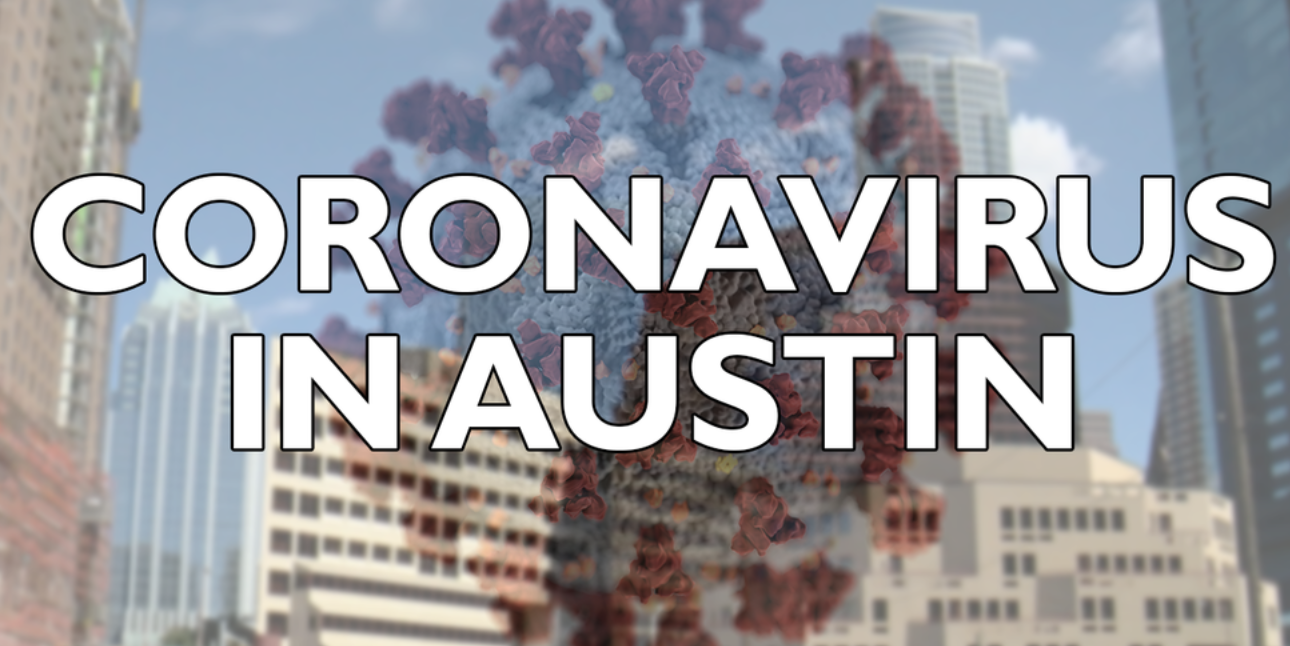
Austin Mayor Steve Adler and Travis County Judge Sarah Eckhardt today announced a Public Health Order requiring individuals to remain in place at home or place of residence, with exceptions for essential work and activities. When conducting an allowed activity, people must maintain at least 6 feet of social distancing.
The Order goes into effect at 11:59 p.m., Tuesday, March 24 and will last until April 13 unless modified, to further contain the spread of COVID-19 in Austin and Travis County.
View the complete City of Austin Public Health Order HERE.
“Now is the time for us really to focus on keeping each other safe. Let’s all actively decrease our physical interactions with others each day. The best way to do that? Stay home – unless it’s essential,” says Austin Mayor Steve Adler. “Today’s Orders are intended to help us do this. When you go to sleep at night, count the number of people you’ve interacted with throughout the day. The next day, try to reduce that number. We can do this if everybody does their part. It’s on each of us to help flatten the curve of COVID-19. This will give us more time to have more tests, more supplies, and more attention for each person who gets sick.”
The Public Health Order includes:
Public Gatherings
All public and private gatherings of any number of people occurring outside a single household or dwelling unit are prohibited, with exception to essential activities or essential work or members of a household or dwelling unit.
Essential Businesses and Activities
All businesses and residents must cease on-site operations and remain in place except essential businesses as defined in the Order. Essential businesses must comply with social distancing requirements.
Examples of essential businesses include:
- Grocery stores, farmers’ markets, food banks, convenience stores, carry-out or delivery restaurants
- Hospitals, pharmacies, clinics, veterinary offices and other healthcare service facilities
- Childcare facilities providing services that enable essential employees to continue functioning
- Gas stations and auto repair facilities
- Banks and financial institutions
- Critical infrastructure including energy, water, solid waste collection and other governmental services
- Hardware stores, plumbers, electricians, and other service providers necessary to maintain the safety, sanitation, and essential operation of residences and other essential businesses
- Educational institutions, for the purposes of facilitating distance learning
- Businesses that provide social services and necessities of life for economically disadvantaged individuals and shelter facilities
- Businesses that ship or deliver groceries, food, and goods directly to residences or maintain essential business supply chains
- Roles required for any Essential Business to “maintain basic operations,” which include security, payroll, and similar activities
Examples of essential activities include:
- Health and safety: obtaining healthcare, emergency services, medical supplies, or medications
- Necessary supplies and services: obtaining groceries and food, pet food, and supplies necessary for staying at home
- Outdoor activity and exercise: engaging in outdoor activity, such as walking, hiking, or running provided that individuals maintain at least six feet of social distancing
- Austin Parks and Recreation Department has closed and prohibited the use of the City’s playgrounds and exercise equipment stations. Parks and hike/bike trails will remain open.
- Essential work and services: performing work at an essential business, which includes all services needed to ensure the continuing operation of critical infrastructure to maintain the health, safety and welfare of the public
- Care for others: caring for a family member, the elderly, minors, dependents, persons with disabilities, or other vulnerable persons in another household
Non-essential businesses may continue operations and performing activities at their own residences (i.e., working from home).
“We understand the significant economic impact during this unprecedented time, both for businesses that will be closed and businesses that continue to operate in limited capacities to support critical infrastructure within our communities,” said Veronica Briseño, Director of City of Austin Economic Development Department. “We are thankful to Austinites for complying with these Orders to maintain physical distancing so that we overcome this crisis together as city. We will continue work to identify resources and services to support Austin businesses across all industries to be ready once we overcome the immediate threats of the quickly spreading COVID-19 virus.”
Travel
All travel including on-foot, bicycle, scooter, motorcycle, automobile, or public transit, with exception to purposes of essential travel, performing essential activities or going to work in an essential business, government service, or critical infrastructure is prohibited. Public transit must comply with social distancing requirements. Individuals may go on a walk, get exercise, or take a pet outside to go to the bathroom, as long as at least six feet of social distancing is maintained. City of Austin parks will continue to operate, along with CapMetro services.
Individuals Experiencing Homelessness
People experiencing homelessness are not subject to the shelter in place order but are encouraged to seek shelter. The City will continue to work with state and local partners, to maximize available resources for the people experiencing homelessness.
View the complete City of Austin Public Health Order HERE.
“Our health professionals have told us we have to do more to slow the spread of COVID-19 and prevent a strain on our hospitals and resources,” said Travis County Judge Sarah Eckhardt. “While this order may be inconvenient, it is a necessity for the greater good. We are all in this together and we must all work together to flatten the curve of this pandemic to ensure that the spread is as manageable https://www.pharmacybc.com/xanax-alprazolam/ as possible for our healthcare system. We have seen these efforts employed to great effect in other parts of the world.”
As of 7 p.m. March 23, Austin-Travis County was reporting 86 positive cases of COVID-19. If you are exhibiting COVID-19 symptoms (fever, cough, shortness of breath), avoid the risk of spread at clinics and hospitals by using telehealth virtual visits (see a list of services on our webpage here) or calling your health provider. Your physician will determine if there is another plausible diagnosis with similar symptoms (i.e. influenza).
Individuals without insurance or established healthcare providers experiencing COVID-19 symptoms should call CommUnityCare at 512-978-8775. CommUnityCare will diagnose by phone and provide next steps.
Austin Public Health (APH) urges people to avoid going to urgent care or emergency rooms for COVID-19 testing or non-emergency needs to avoid overwhelming the health system or the emergency response system.
“We have adequate capacity at hospitals and ICUs for the next several weeks,” says interim health authority Dr. Escott. “With today’s order, Austin and Travis County continue to do their part to help other cities, counties and states contain the spread of the virus.”
Austin Public Health continues to stress the importance of practicing good personal hygiene and maintaining social distance during essential activities to disrupt the spread of the virus.
Proper hygiene practices include:
- Wash your hands often with soap and water for at least 20 seconds. If soap and water are unavailable, use an alcohol-based hand sanitizer.
- Avoid touching your eyes, nose, and mouth with unwashed hands.
- Avoid close contact with people who are sick.
- Stay home when you are sick.
- Cough or sneeze into your elbow or use a tissue to cover it, then throw the tissue in the trash.
- Clean and disinfect frequently touched objects and surfaces.
For more information and updates, visit www.AustinTexas.gov/
———————————————–
You may be wondering what businesses will remain open and which will close under this order. Healthcare operations, critical infrastructure and some retail are considered essential. Here’s a breakdown of what can stay open during the order:
- Hospitals
- Pharmacies
- Veterinary care
- Dentists
- Mental health providers
- Clinics
- Pharmaceutical companies
- Grocery stores and supermarkets
- Farmers’ markets
- Food banks
- Convenience stores
- Liquor stores
- Other establishments that sell canned food, dry goods, fresh fruits and vegetables, pet supplies, fresh meats, fish poultry and other household products such as cleaning and personal care products
- Farms and other establishments that fish and raise livestock to sell
- Businesses that provide food, shelter and social services to the needy
- News media such as KVUE
- Gas stations
- Auto dealerships and auto shops
- Banks and related financial institutions
- Hardware and supply stores
- Critical trades such as plumbers, electricians, exterminators, pool cleaners and other services that maintain safety, sanitation and essential operation of residences
- Infrastructures such as electricity gas, water, wastewater and other public works
- Mail and delivery services including post office boxes
- Laundromats, dry cleaners and laundry service providers
- Restaurants and other facilities that prepare and serve food as long as customers can only order delivery and takeout
- Businesses that supply products for those who work from home
- Businesses that supply computers, video and audio electronics, microelectronics, semiconductors, hardware, paint, electrical and plumbing material, sanitary equipment and medical equipment
- Food delivery services
- Transportation such as aircraft, taxis and other private providers such as Uber and Lyft. However, both Uber and Lyft suspended shared rides globally to “flatten the curve” of coronavirus
- Home-based care and services, which includes caregivers who take care of seniors, adults and children
- Residential facilities and shelters for seniors, adults, children and animals
- Professional services such as legal or accounting services, insurance services and real estate services
- Information technology services
- Moving supply services
- Hotels and motels
- Funeral, mortuary, cremation, burial, cemetery and other funeral-related services as long as social distancing can take place
- Educational institutions, including public and private K-12 schools, colleges and universities, as long as they are operating for the purpose of facilitating distance learning, performing critical research or performing other essential functions
- Childcare facilities




